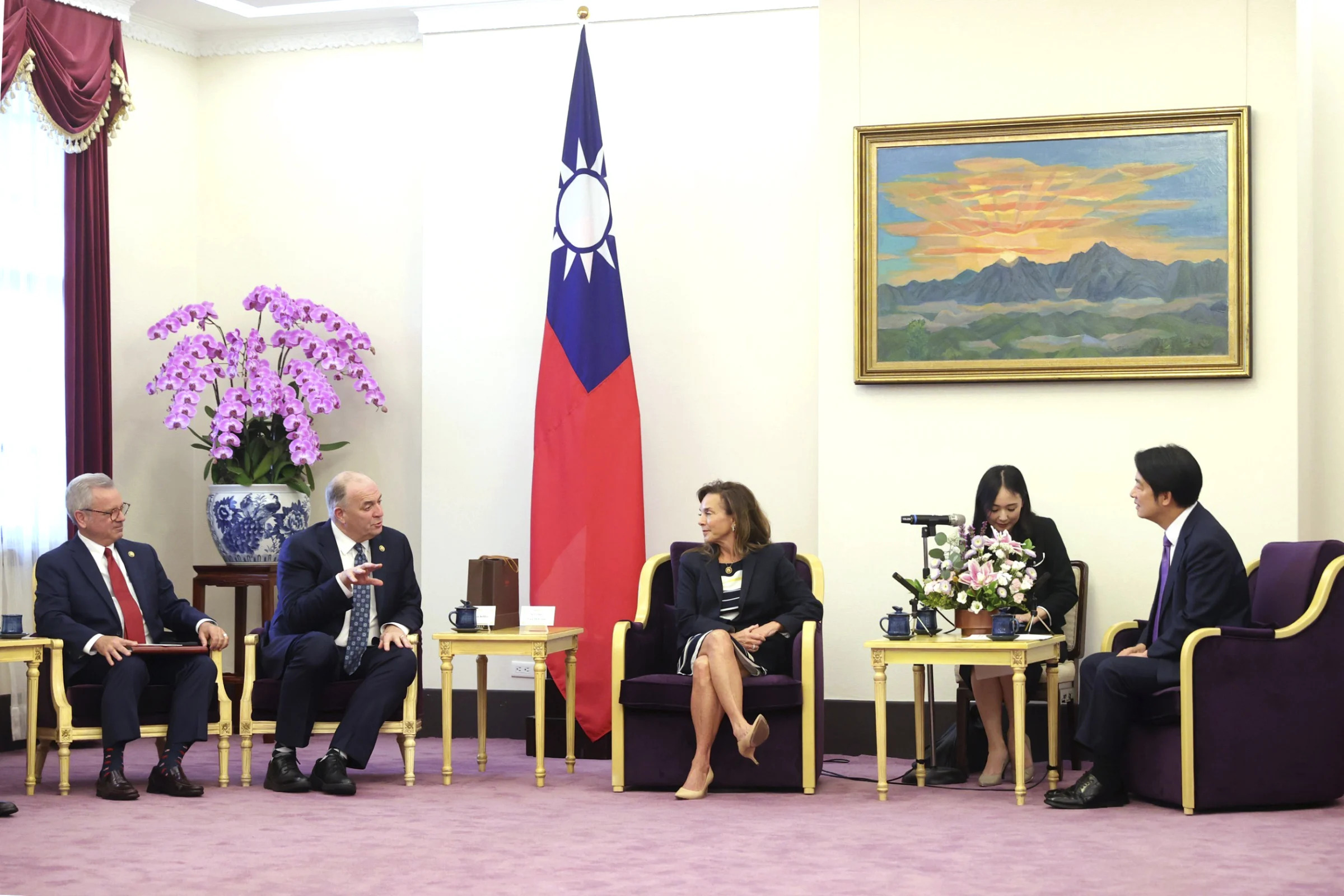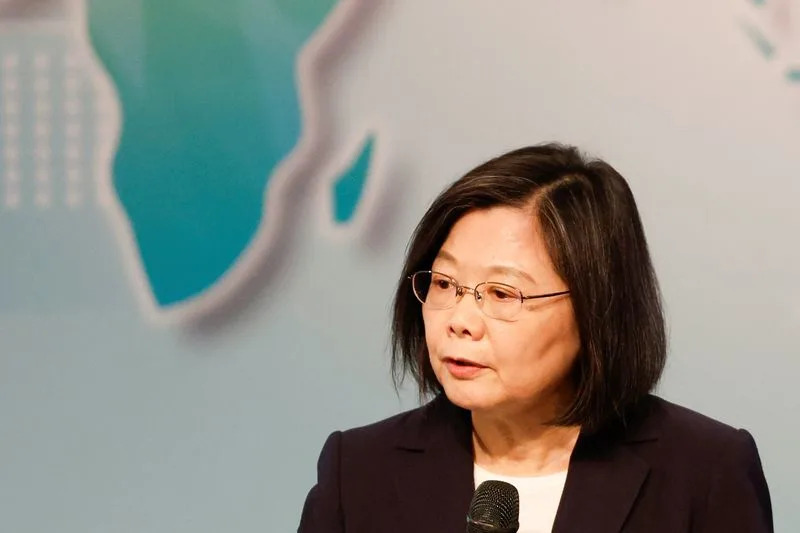China blasts US military aid to Taiwan, saying the island is entering a 'dangerous situation'

In this photo released by the Taiwan Presidential Office, from left Mark Alford, a member of the House Armed Services Committee, U.S. Democratic Congressman Dan Kildee, Lisa McClain, secretary-general of the Republican Caucus of the U.S. House of Representatives meets with Taiwan President-elect and Vice President Lai Ching-te in Taipei, Taiwan on Tuesday, April 23, 2024. McClain and Kildee jointly led a cross-party group of lawmakers to visit Taiwan from April 23 to 25 . Members also include Mark Alford, a member of the House Armed Services Committee.
China on Wednesday blasted the latest package of U.S. military assistance to Taiwan on Wednesday, saying that such funding was pushing the self-governing island republic into a “dangerous situation.”
The U.S. Senate late Tuesday passed $95 billion in war aid to Ukraine, Israel and Taiwan after months of delays and contentious debate over how involved the United States should be in foreign wars. China claims the entire island of Taiwan as its own territory and has threatened to take it by force if necessary.
The mainland's Taiwan Affairs Office said the aid “seriously violates” U.S. commitments to China and “sends a wrong signal to the Taiwan independence separatist forces.”
Office spokesperson Zhu Fenglian added that Taiwan’s ruling pro-independence Democratic Progressive Party, which won a third four-year presidential term in January, is willing to “become a pawn for external forces to use Taiwan to contain China, bringing Taiwan into a dangerous situation.”
On Tuesday, Taiwan’s President-elect Lai Ching-te told a visiting U.S. Congressional delegation that the aid package would “strengthen the deterrence against authoritarianism in the West Pacific ally chain” and “help ensure peace and stability across the Taiwan Strait and also boost confidence in the region.”
The package has had broad congressional support since Biden first requested the money last summer. But congressional leaders had to navigate strong opposition from a growing number of conservatives who question U.S. involvement in foreign wars and argue that Congress should be focused instead on the surge of migration at the U.S.-Mexico border.
The package covers a wide range of parts and services aimed at maintaining and and upgrading Taiwan’s military hardware. Separately, Taiwan has signed billions in contracts with the U.S. for latest-generation F-16V fighter jets, M1 Abrams main battle tanks and the HIMARS rocket system, which the U.S. has also supplied to Ukraine.
Taiwan has also been expanding its own defense industry, building submarines and trainer jets. Next month, it plans to commission its third and fourth domestically designed and built stealth corvettes to counter the Chinese navy as ptensions art of a strategy of asymmetrical warfare, in which a smaller force counters its larger opponent by using cutting edge or nonconventional tactics and weaponry.
China launches daily incursions into waters and airspace around Taiwan by navy ships and warplanes. It has also sought to pick away Taiwan’s few remaining formal diplomatic partners.
However, only two People's Liberation Army Air Force planes and seven navy vessels were found operating in areas around Taiwan between Tuesday afternoon and Wednesday morning, possibly as a result of heavy rainstorms and low visibility overnight along the island's west coast facing China.
At times of heightened tensions, China has launched dozens of such missions over a 24 hour period, many of them crossing the center line in the Taiwan Strait dividing the sides or entering Taiwan's air defense identification zone.
___
A previous version of this story incorrectly stated that the U.S. had approved $8 billion in aid for Taiwan. In fact, the $8 billion figure is the amount to be spent on a range of priorities related to countering China in the Indo-Pacific, including aid to Taiwan.
Taiwan happy with US aid package, China objects to arms sales
Taiwan's President Tsai Ing-wen
Taiwan President Tsai Ing-wen said on Wednesday she was happy the U.S. Congress had passed a sweeping foreign aid package which includes arms support for the island, as China urged Washington to stop selling weapons to Taipei.
The United States is Taiwan's most important international backer and arms supplier even in the absence of formal diplomatic ties. China, which views Taiwan as its own territory, has repeatedly demanded arms sales stop.
The Senate approved by 79 to 18 four bills passed by the House of Representatives on Saturday, after House Republican leaders abruptly switched course last week and allowed a vote on the $95 billion in mostly military aid for Ukraine, Israel and Taiwan and U.S. partners in the Indo-Pacific.
Meeting visiting U.S. lawmakers at the presidential office in Taipei, Tsai referred to the passage of the bills at the weekend.
"We are also very happy that the Senate has just passed these bills," she said.
Defence Minister Chiu Kuo-cheng said areas where the money is to be spent, such as training or equipment, would be discussed with the United States.
"The United States has expressed goodwill, and it needs to be negotiated between us," he told parliament.
China says Taiwan, whose government rejects Beijing's sovereignty claims, is a purely internal matter and the most sensitive and important issue in ties with the United States.
In Beijing, China's Taiwan Affairs Office expressed anger at the bills, which President Joe Biden said he would sign into law on Wednesday.
The bills "send the wrong signal to Taiwan independence separatist forces, and we are resolutely opposed to it", spokesperson Zhu Fenglian told reporters.
"We urge the United States to take concrete actions to fulfil its commitment not to support Taiwan independence and to stop arming Taiwan in any way," she added.
The strengthening of "military collusion" between the United States and Taiwan would not bring security for the island, China's foreign ministry said.
"It will only push up tensions and the risk of conflict and confrontation in the Taiwan Strait," said spokesperson Wang Wenbin.
U.S. Secretary of State Antony Blinken arrives in China on Wednesday for a visit, with Taiwan likely to be one of the topics for discussion.
Taiwan has protested for the past four years about stepped up Chinese military activity near the island, including almost daily missions by Chinese warplanes and warships.
However, since 2022, Taiwan has complained of delays in deliveries of U.S. weapons such as Stinger anti-aircraft missiles, as manufacturers focused on supplying Ukraine to help it battle invading Russian forces.
- Questions and Answers
- Opinion
- Story/Motivational/Inspiring
- Technology
- Art
- Causes
- Crafts
- Dance
- Drinks
- Film/Movie
- Fitness
- Food
- Jogos
- Gardening
- Health
- Início
- Literature
- Music
- Networking
- Outro
- Party
- Religion
- Shopping
- Sports
- Theater
- Wellness
- News
- Culture
- War machines and policy



